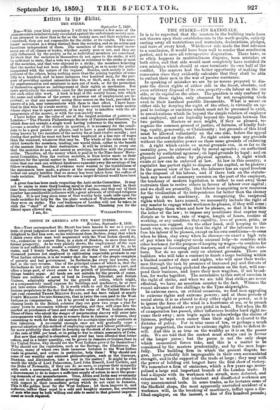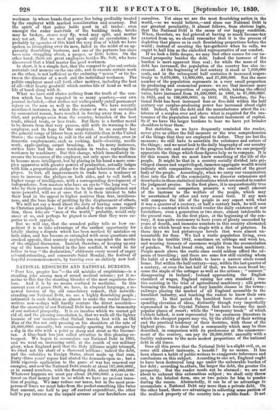TOPICS OF THE DAY.
THE STRIKE—ITS RATIONALE.
IT is to be regretted that the masters in the building trade have not thrown open their establishments to the work-people, entirely casting away all restrictions and restraints, declarations, pledges, and tests of every kind. Whichever side made the first advance to a conclusion, it would have been well to render that conclusion perfect, and to save all retrospective disputation. There have, as so often happens in multitudinous disputes, been mistakes on both sides and that side would most completely have rectified its own mistakes which should at once terminate its own half of the conflict. The masters had the better opportunity of making the concession since they evidently calculate that they shall be able to outlast their men in the war of passive resistance. In speaking of mistakes we are by no means prepared to dis- pute the direct rights of either side in the freest, absolute, and. even arbitrary disposal of its own property—its labour on the one side, or its capital on the other. The question is only confused by denying these rights, only obscured by not recognizing them even in their harshest possible lineaments. What is meant on either side by denying the right of the other, is virtually an ap- peal to feelings or emotions which must not be presumed to exist, to considerations which lie beyond the simple relation of employer and employed, and are logically beyond the bargain between the two parties. Masters or men might, if they so pleased, re- cognize the common ground of justice of fairness, of kindly feel- ing, equity, generosity, or Christianity; but grounds of this kind must be allowed voluntarily on the one side, before the appeal can be enforced on the other. No right exists upon any grounds without the correlative power on those same grounds of enforcing it. A right which exists on moral grounds can, in so far as its morality goes, be enforced only by moral agencies ; on assthetical grounds by teethetical agencies ; on legal grounds by legal ; and on physical grounds alone by physical agencies. A right which exists at law can be enforced at law. At law in this country, a capitalist has perfect right to dispose of his capital, as he pleases; In the general view of the law, the labourer has an equal freedom in the disposal of his labour, and if there lurk on the statute- book any means of summary coercion on the part of the employer, the tendency of modern legislation is rather to cast away those restraints than to revive others in favour of labour over capital; and we shall see presently, that labour is acquiring new resources for the vindication of its independence far better than the clumsy appeal to statute machinery. In recognizing the reciprocal rights which we have named, we necessarily include the right of any master to engage what workmen he pleases, if they will come ; to discharge them when and how he pleases, so that it be within the letter of the law ; to impose any conditions that caprice may dictate as to terms, rate of wages, length of hours, routine of working, or any condition that cupidity, love of power, pride' or meanness can suggest. On the other hand, still keeping to this harsh view, we cannot deny that the right of the labourer to re- fuse his labour if he pleases, except on his own conditions—to come when he likes, stay away when he chooses—to exact a high rata of pay when his employer needs unusual help—to combine with other workmen for the purpose of keeping up wa,ges--te combine for the purpose of favouring pliant masters, and of injuring the stub- born. Nor do we speak only on abstract grounds. There are builders who will take a contract to finish a large building within a limited number of days and nights, who will spur their work- men through the task by promises of increased pay and threats of dismissal, and having pocketed thepremium on the feat, will sus- pend their business, and leave their men wageless, if not bread- less, for weeks together. The correlative to this sort of coercion is the right of strike, and when we are told that strikes are never effectual, we have an assertion counter to the fact. Witness the recent advance of five shillings to the Tyne shipwrights.
In extreme eases, on critical occasions, we find men appealing
to extreme rights and extreme powers; and at these periods of social storm it is as absurd to deny either sight or power, as it is to ignore the force of the wind in a hurricane at sea, or to preach when a brigand stands over you pistol in hand. But when the fit of exasperation has passed, other influences besides hard right re- sume their sway ; men begin agilitit to acknowledge the claims of fairness, perhaps even sooner their sight is cleared to the dictates of policy. For in nine eases of ten, or perhaps a much larger proportion, the resort to extreme rights tends to defeat it- self. And this is as true on the wealthy as it is on the poorer side. We are told that the contest must always end in favour of the longer purse ; but the purse is not the only shape which economical forces take and this is a matter to be considered by the masters prudentially, and by the men hope- fully. The building firm in which the present dispute be- gan, have probably felt impregnable in their own accumulated strength, and in the support of the trade at large ; they may with the power of holding out longest have the first show of victory. We remember a firm of eminence, which a few years ago mono- polized a large and important branch of the London trade. It had a dispute with its workmen who struck, were defeated, and returned to work. But reluctant and disaffected workmen are very uneconomical tools. In some trades, as for instance some of the Sheffield shops, the most apparently unstudied accident of a workman will, m the breaking of machinery, inflict upon a dis- liked employer, on the instant, a fine of five hundred pounds;
workmen in whose hands that power lies being profitably treated by the employer with marked consideration and courtesy. But the spirit of that policy holds good in all trades : even amongst the ruder materials of the building trade, bricks may be broken, stones may fly, wood may split, and mortar may not set. But we need not speak only on speculation ; for probably by agencies of this kind the very firm of which we have spoken as triumphing over its men, failed in the midst of an ap- parently flourishing business, and one of the partners has since been seen straggling about, a pauper, or little better. On the other hand, there are great employers besides Mr. Salt, who have discovered that a kind master has good workmen. In short, it is a simple fact, that the compact to give out certain materials and moneys on the one side, and to execute certain work on the other, is not sufficient as the enduring " nexus " or tie be- tween the director of a work and the individual workmen. The politic employer must call forth other motives, including the best of all—that hearty goodwill which carries life of head as well as life of hand along with it.
What we have said abates nothing from the truth of the cau- tion which has been repeated in so many quarters,—our own journal ineluded,—that strikes not unfrequentiv entail permanent injury on the men as well as the masters. We have recently mentioned instances, in which the claims of men, not sustained by economical reason, have resulted in forcing away from a dis- trict, and perhaps even from the country, branches of the boot trade, riband trade, or lace trade. But there is a further moral to be drawn from that very process, still with its warning to the employer, and its hope for the employed. In no country has the general range of labour been more valuable than in the United States ; the result being to call in the aid of machinery, even in domestic employments, such as cooking, knife-cleaning, needle work, apple-paring, carpet brushing, &c. In many instances, strikes have had the same tendencies in trades, replacing the workmen by machinery. But this change, which immediately in- creases the resources of the employer, not only spurs the workman to become more intelligent, but by placing in his hand a more com- plex apparatus with greater powers of production, actually lodges with him a proportionate pledge for the good behaviour of the em- ployer. In filet, all improvements in trade have a tendency at once to increase the pledges on both sides, and to call forth a higher range of intelligence, with a corresponding development of independence. Now masters who have an eye to "the long run "— who by their position must claim to be the more enlightened and more powerful, will see at once that it is their interest to take their lead in the appeal to higher motives than fear, invidious- ness, and the base hope of profiting by the displacement of others.
We will not say a word about the duty of having some regard to Christian principles ; for if we alluded to that remote jurisdic- tion, those who are "men of the world," probably, would only sneer at us, and perhaps be piqued to show that they were su- perior to such appeals. But we will say, that the soundest policy tells us how ex- pedient it is to take advantage of the earliest opportunity for totally closing a dispute which has been marked by mistakes on both sides, and has become so entangled with cross questions and crooked appeals, that scarcely anybody can remember the merits of the original discussion. Instead, therefore, of keeping up any rag of the banners hoisted in the late conflict, it would be far better to tear "the declaration," obliterate every record of angry misunderstanding, and consecrate Saint Monday, the festival of hopeful recommencements, by turning over an entirely new leaf.



























 Previous page
Previous page